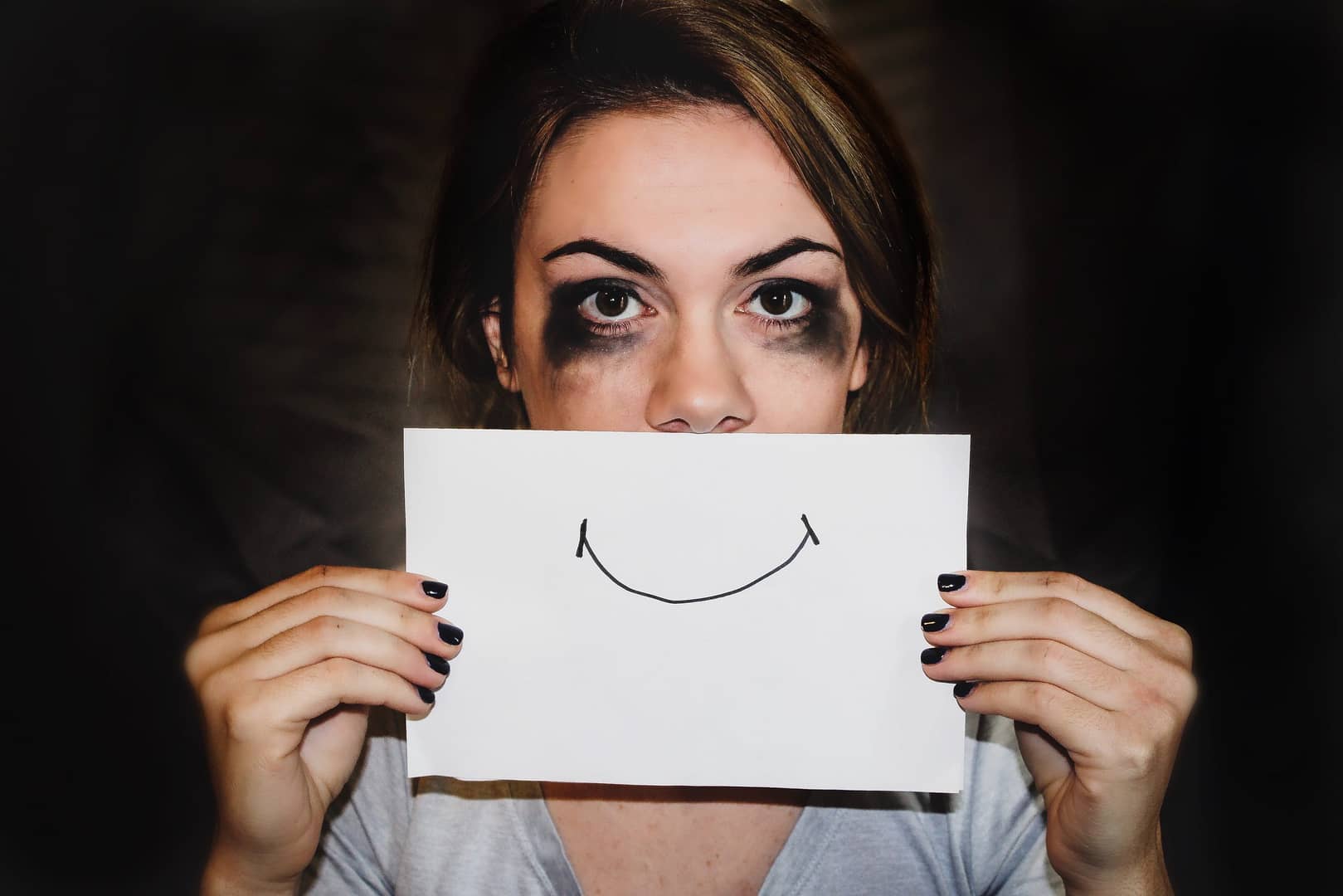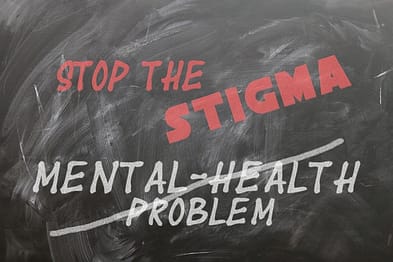*warning sensitive topics maybe discussed*
Picture this. Your walking to class and you see a friend they smile and wave at you. You quickly smile and wave back. It appears that you are happy at first glance, the people around you who saw you smile assume that you are fine. Inside you think you have made a mistake and that your friend wasn’t even waving at you but someone behind you even though nobody was there. You feel stupid, maybe even worthless over nothing.
You continue walking to class mentally beating yourself up trying to forget your “mistake”. You get to class, find your seat, and sit waiting for class to start. Casually starting conversation with nearby friends. You say something but nobody hears you, then you repeat what you said, still nobody hears what you had to say. Then you give up. You go back in the never ending mental state of feeling worthless, stupid, unimportant.
Out of Sight Out of Mind Right?
Mental health has formed a stigma around it that talking about your true feelings is bad and uncomfortable. This basically makes it so people are expected to be perfect and always happy putting people under lots of unnecessary pressure. This stigma makes it almost taboo to talk about deep level thoughts on mental health. Think of social media, most account’s only post the good pictures or the ones that look like they are having a good time. This only shows their best self so it is the only way people view them. This can make others assume that you are fine, making it the default that everyone is happy all the time.
Stigma is formed when people publicly shame and give a bad reputation to a quality, action, or person. In history people placed in mental health institutes were treated very poorly and given treatments that were sketchy to say the least. In an article by Concordia University they explain old mental health practices and how little they knew about what they were doing. This could give off the idea that those with mental health are vicious and even violent due to the intense procedures taken. From a recent survey one person said “They seem so dreary and isolating, like how does a place like this supposed to make me better”. Showing the false portrayal of modern mental institutions and how little people know about the
Spooky Scary Stigma
Think of this when was the last scary movie you watched? Did it have a scary insane asylum? That is part of the stigma if you show something in a scary way that is how people will perceive it as. So if a horror movie is based on a mental hospital people with be scared of them. In a recent survey 21% of people said that mental hospital’s remind them of horror movies, 32% of people said that mental hospitals creep them out, 13% saying they scare them, and 8% saying that there are too many crazy people. One person said “the idea is good but the media portrays it as a horror scene” and another person saying “there is a stigma that is unfair but I can’t get passed it”. Within all of the misleading stereotypes about mental hospitals many people can get the wrong idea about them.
Without people willing to change nothing will get done and the stigma will continue. In a recent study only 11% of students said they have been to the councilor to talk about personal matters and over 45% who had never even been to the councilor at all. This is just one example of how people could be scared or even hesitant to go to the councilors for help. In an article by Touro University they went over ways to break the stigma and how those with mental health issues will be hesitant to get the help they need. In an article by The National Alliance of Mental Illness said that 1 in 5 people have mental illness over 60% of those did not go and seek help.
From a personal level I know I need to get help but refuse to do so because I think that people are going to see me as a different person. That’s not okay that I am worried about other people’s reactions instead of my own mental health. I should not be scared to get help because of how I think others will react.
Sarcastically Happy to be Alive
Something that I have noticed is whenever someone makes a reference about mental health, it is either in a joking manner to make it seem like it is a funny topic, or it ends in an awkward silence. For example the other day a friend and I were talking and began talking about mental health, we started making casual jokes which escalated to very not ok serious jokes about suicide, which ended in an awkward silence. Another instance of this was recently I was talking to some people and we were discussing how you don’t hear about suicides at all really. You only hear about the big suicides the ones that are really dramatic because there are to many to put in the news.
For example the golden gate bridge is a well known place for people to commit suicide. Over 1,400 people have leaped from this landmark since its opening in 1937 according to The Los Angeles Times. These deaths were often in the news but they stopped due to how popular this location became.
[perfectpullquote align=”right” bordertop=”false” cite=”” link=”” color=”” class=”” size=””][/perfectpullquote]
“People think depression is sadness. People think depression is crying. People think depression is dressing in black. But people are wrong. Depression is the constant feeling of being numb. Being numb to emotions. Being numb to life. You wake up in the morning just to go back to bed again.” A quote from Sydney Sims
In a recent survey roughly 64% of people said they were uncomfortable talking about deep level emotions. Which would make sense with the awkward silence that is commonly found when talking about these topics in a serious way. Along with the “jokes” made to talk about these important issues it makes the topic of mental health funny. When in reality mental health should be treated the same as normal health. Although making jokes about such a serious topic maybe somebody’s way of reaching out for help, it should still be seen seriously. I asked one friend if they ever make jokes about mental health and if they do so to show they are hurting, they responded very quickly with “Oh definitely”.
One story from a close friend reflects this. “It took me a long time to get help, probably about 3 years” it is hard for people to build up enough courage to get help and even when they do it may not even help. “I tried going last year around December for a couple months but nothing was changing so I stopped things got much worse over the rest of the school year” they then go on to say “I made a plan to kill myself by the end of the summer and the day I was going to do it my mom ended up staying home because she was worried”. I have talked about this with them before and it is the reason they are still alive. If they would have commited suicide I would not know them as well as I do today. Although they may still “Bad thoughts” they are doing much better since they have gotten the help they need. “I needed to start therapy again and to try antidepressants and started in september”.
On Common Ground
Another thing I noticed was how common mental health really is so the stigma that surrounds it is absurd. In a recent poll 84% of people said they knew someone with a mental illness. Along with a study done by The National Institute of Mental Health said that 43% of adults will have some form of mental illness. If so many people have a mental illness then why is there such a known stigma towards mental health?
If our population has so many mental health issues we must find ways to break the stigmas. In an article by The Mayo Clinic they gave suggestions of how to cope with the stigmas that surround mental illness, although these suggestions may be very useful it does not address the root problem. It goes over how to get help and how to deal with the strain mental health can put on a person.
With rising numbers of mental health people must be educated on this widespread topic. In an article by Psychology Today they said that there is a rise in mental health issues, but we have better access to the help we need. Although mental health rates have gone up suicide rates have dropped since the 1990’s when antidepressants were introduced. With better access to help, suicide rates and mental health problems will decline. More knowledge plus better access to help will help fix the mental health epidemic.
Stronger Than The Struggle
On the other hand some may not notice anything wrong with mental health or those who have it. In a recent survey 34% of people said they would treat someone the same if they were diagnosed with a mental illness. Along with 60% of people said they would be okay with someone being concerned about their well being.
Even though mental health may be relevant in today’s society some might not even notice the stigma around it or disregard it. In an article written by Jazmin she said “They told me how brave I was, how strong I was to admit being in a bad place and to ask for support.” People can be caring and helpful in rough time’s surrounding mental health not everyone is part of the stigma.
[perfectpullquote align=”full” bordertop=”false” cite=”” link=”” color=”” class=”” size=””][/perfectpullquote]
“They made me realise it’s okay not to be okay.”
Jazmin also goes on to say how mental illness can be cured and you can overcome the challenges that come with the burden of mental illness. She said to “express your emotions, tell people how you feel, rant to somebody, just let it out. Yell for help if you have to.” Urging others to seek the help they may need or to prevent bigger problems. Another example of this is from a friend “I am very open to talking about mental health, I know that not many people are but normalizing it I think is Important” stigma can be overcome and normalized with more people willing to ignore the stigma.
**If you are in a crisis or in need of help call please call the National Suicide Hotline 1-800-273-8255 or visit the National Suicide Prevention Lifeline website**









What do you think?
Show comments / Leave a comment